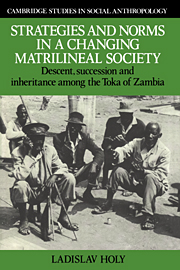 Strategies and Norms in a Changing Matrilineal Society
Strategies and Norms in a Changing Matrilineal Society Published online by Cambridge University Press: 25 August 2009
An important part of the cognitive or cultural order are the standards or rules which state what people should or should not say or do under given circumstances; they are usually spoken of by anthropologists and sociologists as norms (Homans 1950: 124; Blake and Davis 1964: 456).
The relationship between the ‘norms to which the actors subscribe or which they recognise and the social transactional processes in which they engage is rarely one of neat congruence; it is characteristically dialectical’ (Keesing 1971: 126). This dialectical relationship can be dissected by considering it as two analytically distinguishable processes. The first is the process through which the norms that the actors recognise enter into the events and transactions in which they engage; the second is the process through which the ongoing transactions affect the norms to which they subscribe and which they are themselves able to quote as guiding their interactions. In the study of the first process, it is the observable interactions that are treated as problematic, in the study of the second one, it is the proclaimed norms. The generalisations about the first process can always be formulated in terms of the actors' strategies and above all in terms of the goals which they pursue in the course of their strategic behaviour. Such a generalisation was suggested in the preceding chapter.
This chapter is concerned with analysing the process of the emergence of a new norm of inheritance.
To save this book to your Kindle, first ensure [email protected] is added to your Approved Personal Document E-mail List under your Personal Document Settings on the Manage Your Content and Devices page of your Amazon account. Then enter the ‘name’ part of your Kindle email address below. Find out more about saving to your Kindle.
Note you can select to save to either the @free.kindle.com or @kindle.com variations. ‘@free.kindle.com’ emails are free but can only be saved to your device when it is connected to wi-fi. ‘@kindle.com’ emails can be delivered even when you are not connected to wi-fi, but note that service fees apply.
Find out more about the Kindle Personal Document Service.
To save content items to your account, please confirm that you agree to abide by our usage policies. If this is the first time you use this feature, you will be asked to authorise Cambridge Core to connect with your account. Find out more about saving content to Dropbox.
To save content items to your account, please confirm that you agree to abide by our usage policies. If this is the first time you use this feature, you will be asked to authorise Cambridge Core to connect with your account. Find out more about saving content to Google Drive.